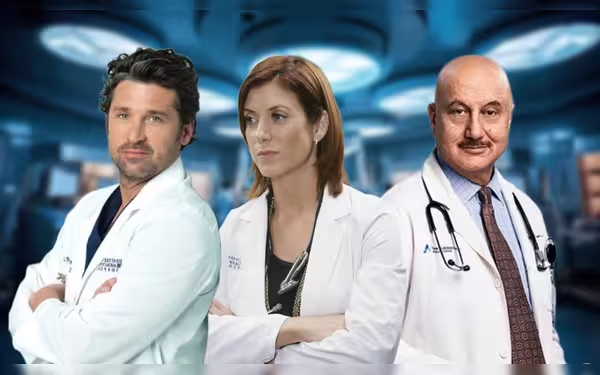Saturday, November 16, 2024 07:39 PM
Evolving Portrayal of Doctors in Medical Dramas
- Doctors now depicted as flawed antiheroes.
- Older physicians bring experience and wisdom.
- Ethical dilemmas add depth to narratives.
 Image Credits: tribune.com.pk
Image Credits: tribune.com.pkExplore the shift in medical dramas from heroic doctors to complex antiheroes, reflecting realism and ethical dilemmas in healthcare.
In recent years, the portrayal of doctors on television has undergone a significant transformation. Gone are the days when medical professionals were depicted solely as heroic figures, saving lives with their impeccable skills and unwavering dedication. Instead, audiences are now introduced to a new breed of characters—those who are not just heartthrobs but also antiheroes. This shift reflects a broader change in storytelling, where complexity and realism take precedence over idealism.
Take, for instance, the classic medical dramas that have graced our screens. Shows like "House" have redefined the archetype of the doctor. Dr. Gregory House, played by Hugh Laurie, is a brilliant yet deeply flawed character. He is a genius in diagnosing rare diseases but struggles with addiction and personal demons. This portrayal resonated with viewers, as it presented a more relatable and human side to the medical profession. Audiences began to appreciate the idea that doctors, like everyone else, have their own battles to fight.
Now, consider the introduction of characters who are not just young and attractive but also seasoned professionals. The narrative has shifted to include older physicians who bring a wealth of experience to the table. These characters may not fit the traditional mold of a TV doctor, but they offer a refreshing perspective. They are competent, wise, and often more grounded than their younger counterparts. This change allows for a richer exploration of themes such as mentorship, the challenges of aging in a demanding profession, and the importance of emotional intelligence in healthcare.
Moreover, the rise of antiheroes in medical dramas serves to highlight the ethical dilemmas faced by healthcare professionals. These characters often grapple with moral ambiguities, making decisions that challenge the very essence of their profession. This complexity adds depth to the narrative, inviting viewers to engage in discussions about the real-life implications of such choices.
As we continue to witness this evolution in the portrayal of doctors on television, it is essential to recognize the impact it has on public perception. While the traditional image of a doctor as a flawless savior may still hold some appeal, the introduction of flawed, relatable characters encourages a more nuanced understanding of the medical field. It reminds us that behind the white coats and stethoscopes are individuals who face their own struggles and imperfections.
The shift from heartthrobs to antiheroes in medical dramas reflects a broader trend in storytelling that values authenticity and complexity. As viewers, we are invited to explore the multifaceted nature of healthcare professionals, fostering a deeper appreciation for their roles in society. This evolution not only entertains but also educates, prompting us to think critically about the challenges faced by those who dedicate their lives to healing others.













